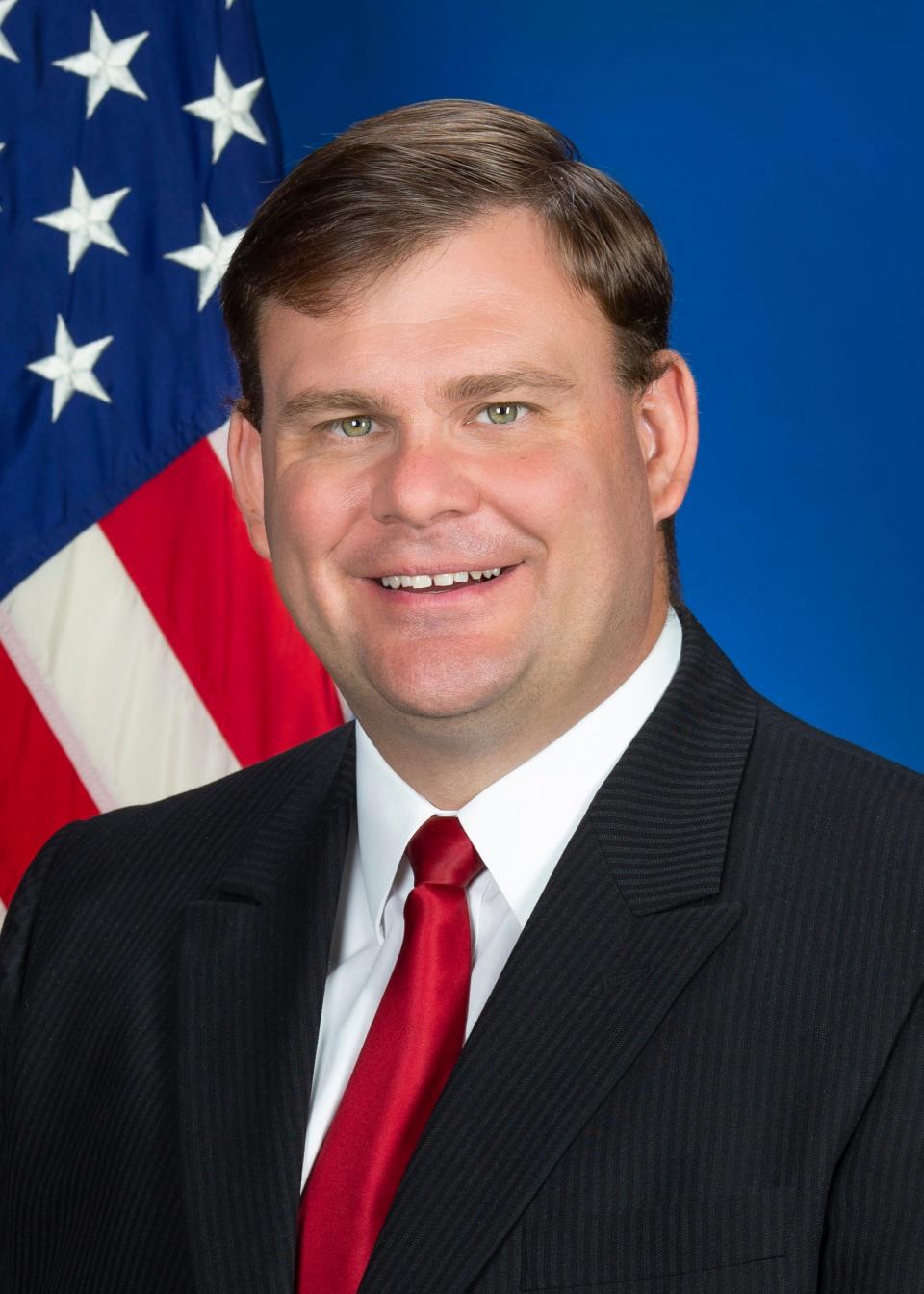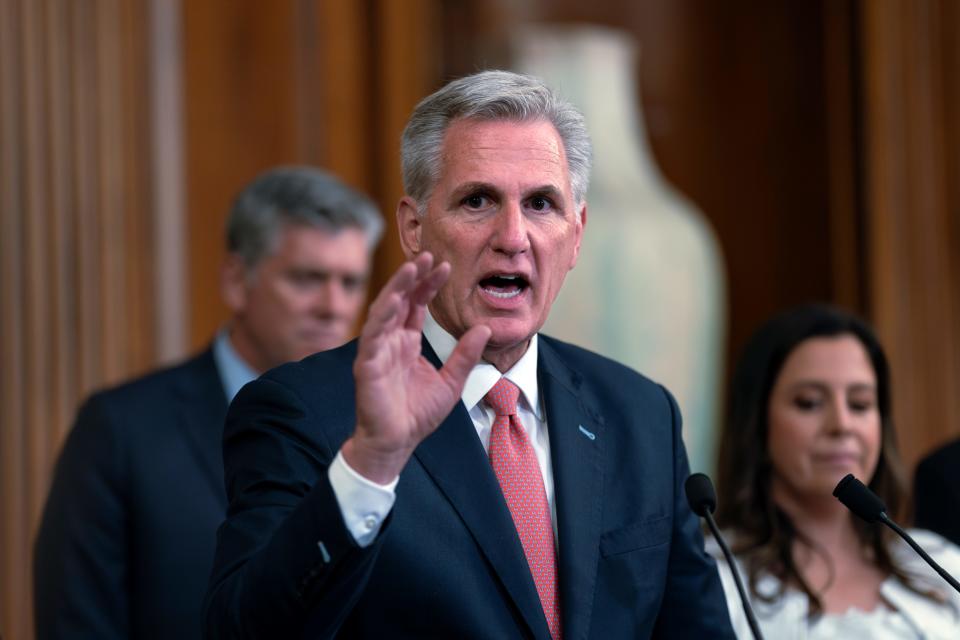How the GOP may be holding some leverage with the incomplete Pa. budget: Pa. Pressroom
- Oops!Something went wrong.Please try again later.
Pa. Pressroom is a regular recap of politics in Harrisburg and Washington, D.C. To submit tips and news leads, contact USA TODAY Network Pennsylvania state capital bureau reporter Bruce Siwy at bsiwy@gannett.com or on Twitter at @BruceSiwy.
About $1.1 billion in basic education funds, school Social Security payments and other expenses are left in the purgatory of a semi-resolved budget stalemate in Harrisburg.
By signing House Bill 611, Democratic Gov. Josh Shapiro and the divided General Assembly authorized the vast majority of 2023-24's proposed spending. Nearly a dozen other expenses still require corresponding code bills, remaining at the mercy of continued negotiations between the Republican-led Senate and the lower chamber headed by Speaker of the House Joanna McClinton, D-Philadelphia.
"I don't think a budget impasse with a new governor is all that unheard of in Pennsylvania," said Anne Wakabayashi, a Democratic ad maker in the commonwealth.
Veteran GOP political consultant Christopher Nicholas believes political dealings are far from done in this budget. He said he doesn't expect Republicans to give up on the proposed Pennsylvania Award for Student Success, aka PASS, a scholarship program that would fund private-school tuition for students in underperforming districts.
PASS has been a priority of the conservative Commonwealth Foundation and an associated "dark money" group that doesn't disclose its donors.
Shapiro had endorsed the concept on the campaign trail and in office. But last week he vetoed its line item after the initiative was met with resistance from his within party and the public school teachers' union that helped to finance his bid for the office.

Senate Republicans' decision to pass the bulk of the budget last week after a monthlong delay relieves the building pressure of funding most agencies, departments and programs as negotiations continue, Nicholas said.
Still, Democratic priorities such as teacher stipends and a $100-million Level Up funding boost for underfunded public schools remain in limbo without the corresponding code bills from the Legislature. They could be used as bargaining chips if GOP leadership plays hardball.
"There's a lot of wrangling to do," Nicholas said.
The situation could be further complicated by the makeup of the House, where the party line has been an even 101-101 since state Rep. Sara Innamorato (D-Allegheny) resigned this summer to run for county executive. McClinton press secretary Nicole Reigelman has said the House won't return to session until negotiations are finalized.
The House calendar lists a tentative return date of Sept. 26, which is a week after the special election for Innamorato's seat is scheduled.
"How they (work this out) is above my pay grade," Nicholas said. "(The situation) does make things certainly even more interesting."
For most other Pennsylvania departments and agencies, however, the passage of House Bill 611 puts an end to the anxiety of how core functions will be financed.
"We won't have to struggle to figure out how we're going to keep those programs funded in the absence of state funding," said Lisa Schaefer, executive director for the County Commissioners Association of Pennsylvania. "(It's) slightly delayed, but not enough to make a huge impact."
"It really takes a lot of stress off the counties."
Virtually all state funding for counties — covering mental health, homeless assistance, substance abuse programs, child welfare and other human services programs — is restored through House Bill 611, according to Schaefer. The mental health programming allocation is receiving a $20-million boost, which is the first increase in 15 years.
The new criminal indigent defense program is the lone county allocation that remains sequestered, Schaefer said.
Inside the Beltway
After passing the first new federal gun control bill in decades, hundreds of members of Congress are pushing for a follow-up.
The Bipartisan Background Checks Act of 2023 would bar private firearm transfers until a licensed gun dealer, manufacturer or importer first takes possession of the weapon to do a background check. Certain exchanges, such as a gift between spouses, would be exempt from this requirement.
U.S. Rep. Mary Gay Scanlon (D-Pa.) joined members of the congressional Gun Violence Prevention Task Force last week in calling for Speaker of the House Kevin McCarthy (R-Ca.) to stop canceling votes on the measure.

"Our children deserve a vote to prevent gun violence from harming them or their families," Scanlon said Thursday on social media. "Voters deserve to know where their representatives stand on this critical issue."
Our children deserve a vote to prevent gun violence from harming them or their families. Voters deserve to know where their representatives stand on this critical issue.
I'm joining @RepThompson and the @HouseGVP in calling on @SpeakerMcCarthy to hold a vote. https://t.co/I5hgLPOI5A— Congresswoman Mary Gay Scanlon (@RepMGS) August 3, 2023
And the horse race
The Department of Justice recently ended two years of speculation by announcing charges against former President Donald Trump related to the 2020 election and ensuing Capitol riot.
Multiple indictments and potential trials would mean the end of political campaigns for many. But two of Trump's strongest critics are telling supporters he's still the favorite.
“The nation needs to wake up to the very real threat that Trump will win the presidency," said Rick Wilson and Reed Galen, co-chairs of The Lincoln Project.

"He IS the Republican nominee. He IS leading in the polls against Joe Biden. The MAGA GOP is a cult that no longer cares about the rule of law and wants to send Trump back to the White House. No indictment is going to stop his campaign."
The Lincoln Project is a political action committee created in 2019 by former and current Republicans who've spent millions from donors in an effort to stop Trump from serving another term.
Its co-chairs' concerns about Trump's legal troubles not denting his candidacy may be valid: A national Emerson College Polling survey in 2022 found that a plurality of voters in swing states such as Pennsylvania and Ohio were more likely to support Trump in the weeks after the FBI raided his Mar-a-Lago estate in search of classified documents.
Photo gallery: Donald Trump rally brings hardcore fans, and a few foes, to Erie Insurance Arena
This article originally appeared on York Daily Record: Does Pennsylvania have a buget? Yes and no

